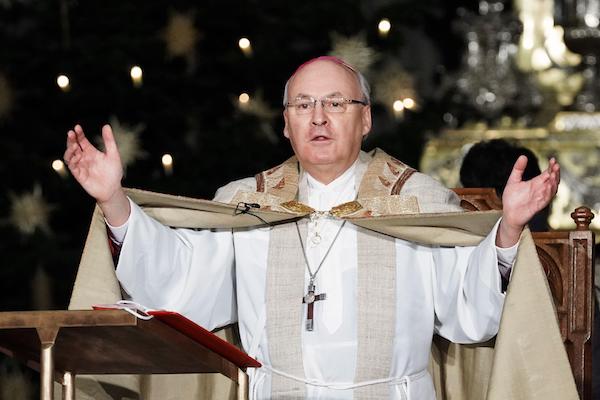The Kyiv government has backed plans to curb Ukraine's Moscow-linked Orthodox church (UOC) on security grounds, as the country's Greek Catholic archbishop accused invading forces of a "planned policy" to drive civilians from occupied areas.
“We must create conditions in which actors dependent on the aggressor state will have no opportunity to manipulate Ukrainians and weaken Ukraine from within,” President Volodymyr Zelenskyy explained in a national address.
“All bodies responsible for ensuring national security should intensify measures to detect and counter subversive activities by Russian special services in Ukraine's religious environment.”
The president issued the statement as Ukrainian security agents continued searching UOC churches and monasteries, while preparations were made for parts of Kyiv's historic Pechersk Lavra, or Monastery of the Caves, to be handed over to the country's independent Orthodox church.
He said his government would act “legally and democratically” in the national interest, but added that the new law would also prevent “religious organisations affiliated with centres of influence in the Russian Federation” from operating in Ukraine.
However, the proposed measures were condemned by the UOC's spokesman, Archpriest Mykolai Danylevich, who warned that his Church's clergy and lay members would never agree to transfer to the independent Church, as well as by Russia's Moscow Patriarchate, which branded them a “political game”.
“The Ukrainian leadership is prepared to act against its own defenceless population, against believers and clergy from the largest and only canonical Orthodox Church,” the Patriarchate's spokesman, Vladimir Legoyda, said in a weekend social media post.
“This bill not only encroaches on legal norms, but also reveals a loss of remaining common sense, given that the UOC has always supported its people and the Ukrainian state in every way it could, calling and praying for peace.”
Meanwhile, Ukraine's SBU security service confirmed on Monday it had searched UOC monasteries and diocesan offices in Poltava and Kremenchuk to “protect the population from provocations and terrorist acts”, after previous raids in Rivne, Zhytomyr, Vinnitsya and other towns, and had also placed nine UOC bishops and metropolitans on a sanctions list for “supporting and collaborating with occupation forces”.
The moves took place as Ukraine claimed to have shot down most Russian missiles during a new mass strike on Monday against its power and water supplies, and as several deaths and injuries were reported in explosions at Russian airbases near Ryazan and Saratov.
Addressing children from the occupied Donbas in Moscow's Christ the Saviour cathedral last Friday, Russia's Patriarch Kirill described the region as the “front line of defence for the Russian world”, adding that love for Russia required faithfulness to ideals underlying “the national culture and Orthodox faith”.
However, the head of Ukraine's Greek Catholic Church “points of resistance” across the country had now also become “spaces of solidarity, mutual support and service”, and urged help from the Archangel Michael in heading off Russian attacks during the winter.
“The Russian aggressors are pursuing a planned tactic and policy of depopulating our Ukrainian lands, especially those they have managed to occupy,” Major Archbishop Svietoslav Shevchuk said in his national message on Monday.
“While 2.8 million Ukrainians have been forcibly deported or expelled from their seized towns and villages, according to latest data, those territories controlled by our authorities are suffering the methodical destruction of their infrastructure to lower the morale of inhabitants and make them leave.”
The Pope condemned the “indiscriminate destruction of civilian infrastructure” as an “international crime” during a weekend meeting with politicians and diplomats, also urging Christians in a book preface published by Italy's Corriere della Sera daily not to “allow hearts and minds to harden from repetition of these gravest atrocities against God and man”.
The appeal followed Russian attacks on the Pope for an interview last week with the US Jesuit journal America, in which he suggested that Chechen and Buryat soldiers “not of the Russian tradition” had shown worst cruelty in Ukraine – a claim branded “shocking and totally unchristian” by Moscow's foreign minister, Sergei Lavrov, and a “Russophobic perversion” by his Ministry's spokesperson, Maria Zakharova.


 Loading ...
Loading ...